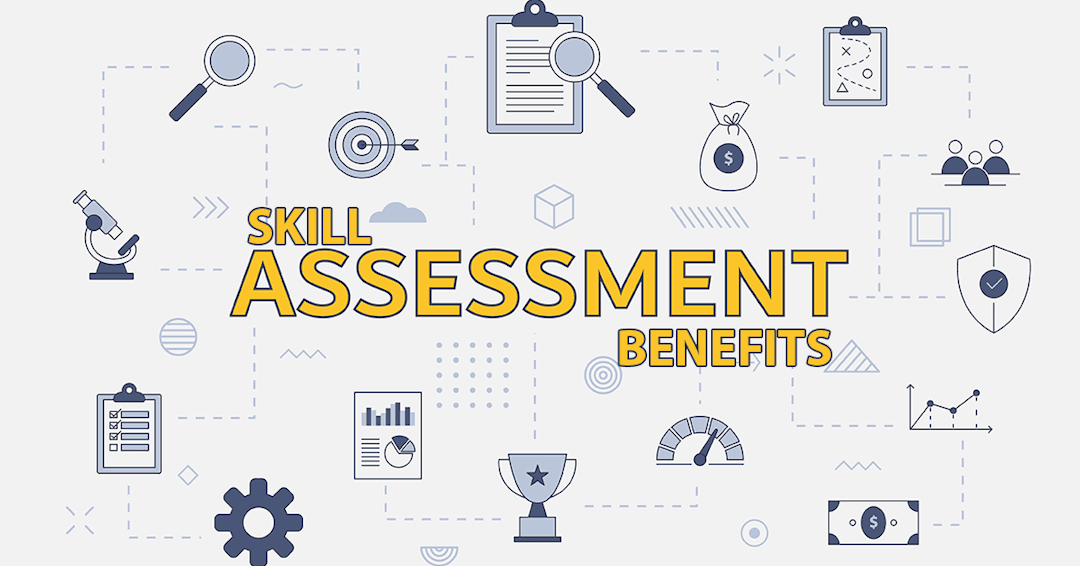Skill assessment tools: Benefits you are missing out on.
Published on January 7th, 2023
After repeated interviews, you may have come to understand that not everyone who talks well might walk the talk. Skills assessment tools are designed to measure an individual's abilities and knowledge in a specific area. In a 2025 survey of over 1,500 professionals, 96% said that skill assessments are a valuable tool for hiring and managing employees (source: Capterra). These tools are increasingly being used by businesses, educational institutions, and other organizations to pinpoint strengths and weaknesses among employees or students and identify areas requiring additional training or development.
Companies like HireQuotient now provide advanced skill and video assessments using AI-driven analytics to help filter job applicants and highlight the top performers from the talent pool. Despite the known benefits of using skills assessment tools, some organizations still overlook their full potential. To address this gap, here’s an updated overview of the different types of skill assessment tools in 2025:
What are the different types of assessments?
Organizations can choose from several types of skills assessment tools to measure employee or candidate capabilities effectively. Common tools include:
Aptitude tests
These tests measure an individual's potential to learn or perform specific tasks. They are especially useful for hiring entry-level employees or interns. Types of aptitude tests include:
Verbal aptitude tests: Measure language comprehension and usage skills.
Numerical aptitude tests: Assess the ability to work with numbers.
Spatial aptitude tests: Evaluate the ability to visualize and manipulate shapes or objects.
Logical reasoning tests: Gauge problem-solving and critical-thinking abilities.
Personality tests
These tests evaluate characteristics such as attitudes, values, and motivations. They help identify individuals suited to specific roles or organizational cultures and highlight areas needing support. Examples include:
The Five Factor Model (FFM): Measures personality dimensions such as conscientiousness, agreeableness, and extraversion.
The Myers-Briggs Type Indicator (MBTI): Explores personality traits like intuition versus sensing or thinking versus feeling.
The Enneagram: Maps nine personality types to understand behavioral tendencies.
AI-powered adaptive personality assessments: Tailor questions dynamically for increased accuracy and relevance.
Knowledge tests
These tests measure understanding in specific subject areas. They’re used to assess readiness for roles or tasks and highlight training needs. Examples include:
General knowledge tests: Evaluate broad subject awareness.
Subject-specific tests: Focus on niche areas of expertise.
Job-specific tests: Assess knowledge required for particular roles, increasingly using interactive and real-world scenarios.
Skills tests
These tests measure the ability to perform specific tasks or activities. Types of skills tests include:
Manual skills tests: Evaluate physical task performance.
Cognitive skills tests: Measure problem-solving and information processing abilities.
Technical skills tests: Assess proficiency with specific tools, software, or equipment, often using simulations.
Soft skills assessments: Evaluate communication, teamwork, and adaptability using scenario-based tests.
Modern platforms now integrate AI and machine learning to deliver customized, interactive assessments that are adaptive and predictive.
The benefits of using skills assessments
Skills assessments have become essential for modern recruitment and talent management. Updated benefits include:
Enhanced hiring accuracy
With tools powered by AI, assessments are more predictive and unbiased, ensuring organizations hire the most qualified candidates, thus improving productivity and reducing costly hiring mistakes.
Targeted training and development
Skill assessments highlight specific gaps, enabling personalized training programs that align with employee career paths, boosting satisfaction and retention.
Proactive skills gap analysis
Advanced analytics provide real-time insights into organizational skills shortages, aiding in workforce planning and upskilling efforts, especially for businesses adopting emerging technologies.
Increased efficiency
Identifying strengths allows better task allocation, improving project outcomes and operational workflows.
Promoting diversity and inclusion
Objective assessments mitigate biases, ensuring fair treatment in hiring and promotions, fostering a diverse workplace with broader perspectives and creativity.
Retaining top talent
Assessments help recognize high-performing individuals, enabling organizations to develop retention strategies and create opportunities for growth.
Succession planning
Identifying leadership potential through skills assessments helps prepare future leaders, ensuring smooth transitions and long-term organizational stability.
Enhanced collaboration and communication
Understanding individual strengths helps optimize team structures, fostering better collaboration and higher productivity.
Future-proofing the workforce
Continuous assessments help organizations adapt to global shifts and new technologies, ensuring competitiveness in an ever-changing market.
Conclusion
By 2025, skills assessment tools have evolved to become indispensable for organizations across industries. They offer precise measurements of skills and abilities, allowing businesses to make better hiring decisions, design tailored training programs, bridge skills gaps, and stay competitive. With advancements in AI and technology, these tools now deliver deeper insights and foster fairer, more efficient workforce management. Incorporating skills assessments into talent strategies is essential for ensuring success and growth in a dynamic business landscape.
Hire the best without stress
Ask us how
Never Miss The Updates
We cover all recruitment, talent analytics, L&D, DEI, pre-employment, candidate screening, and hiring tools. Join our force & subscribe now!
Stay On Top Of Everything In HR

